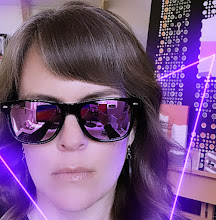In August 2015, about seven months into my last day job, already miserable juggling unfulfilling full-time work, two young kids, and virtually no time for creativity of any kind (but nevertheless trying desperately to squeeze in "art" projects like this one and this one and this one), after dropping off my kids at preschool and summer camp, I heard Felicia Day on my local public radio station talking about her new memoir, You're Never Weird On The Internet (Almost). Despite a couple of decades of prodding by my husband (who, at some point a few years ago, gave up) I've never been one for video games (aside from Dance Dance Revolution, Karaoke Revolution, and most recently, Just Dance) but something about what Day said really stuck with me. I can't recall now the specific words that resonated with me then, but I immediately added her book to my Amazon wishlist and when a gift card coincided with the book being released in paperback, I bought it. Last night I finished reading it (it was a quick read but took me a few months to get around to starting it) and here are five reasons why you, creative person, should read it, whether you're into gaming or not.
 |
| For the record, I like reading "real" books AND e-books on my Kindle. |
1. The mental health benefits of diversifying your creative portfolio.
After Day moves to Los Angeles to pursue a career in acting, she counterweights the frustration of acting classes and auditions with what eventually turns into a World of Warcraft obsession. But before she spends twelve hours a day playing the game, she writes about how, in addition to bonding with her brother, "a part of Hollywood-defeated Felicia Day was 'fixed' by my double life as a tiny little penis-haired gnome." This is, I suspect, how many artists feel about their day jobs (and vice versa). I am not one of them. But this is how I feel about alternating between art-making (and the discouragement of serial rejection), and writing my screenplay (it can't be rejected until it's finished and shared - ha!). I guess this is to say it helps to not put all your creative eggs into one basket, for your sanity, if nothing else.
2. Sheer obstinate grit.
About halfway through the book, Day writes about her goal to finish the pilot script for her web series The Guild by the end of that December. "What drove me to continue? Sheer obstinate grit." This is really what any creative endeavor comes down to, after all. Write those words down on an index card and pin them to your mirror, bulletin board, laptop, etc.
3. An overview of #GamerGate and parallels to our current political climate.
Especially if, like me, it wasn't on your radar quite as much as it was for folks(/women) in the world of gaming, this is an important chapter to read. There are direct links between the #GamerGate "movement" and the alt-right, of course, but even without digging into that, the parallels to what's going on in politics right now under the "leadership" of President Trump are stunning (in a bad way). Day writes, "I think the same viral effect that leads people to share a crazy Korean music video a billion times is the same kind of phenomenon that helped give rise to #GamerGate." A few pages later she continues, when #GamerGate didn't quietly go away, "the issue somehow morphed from attacking a single woman over a messed-up revenge post to a quasi-conservative movement striving for 'ethics in game journalism'...They focused a large amount of their wrath on people trying to add dialogue about feminism and diversity in gaming, condemning them as 'Social Justice Warriors.'" You could plug in almost any social issue facing our country today and the dynamics of conservative media to these sentences and it would still be spot on.
Day continues: "#GamerGate as a movement created an environment for the attacks to flourish. Hell, it ORIGINATED with them. A great quote from a video series called Folding Ideas put it best: 'The use of fear tactics, even if only by a minority, creates an environment of fear that all members enjoy the privilege of, whether they engage in them or not.'" Um, hello, Trump effect?
Finally, on the "good and bad" of the internet, she writes: "What frightened me the most about my #GamerGate experience was the possibility that this could be the future of the internet. That the utopia I thought the online world created, where people don't have to be ashamed of what they love and could connect with each other regardless of what they looked like, was really a place where people could steep themselves in their own worldview until they became willfully blind to everyone else's." It's so easy to let this happen, regardless of where you fall on the political spectrum, and the consequences can be devastating.
In summary, this chapter in particular was basically my #GamerGate woke moment. And it's important for creative folks to be aware since so much of what we do is shared on the internet.
4. The importance of failure, blah, blah, blah.
When, in 2014, YouTube ceased funding for the Geek & Sundry channel, Day "immediately went home and wrote down the top things [she'd] learned going from naive actress to experienced web series show runner to world-weary start-up lady with Geek & Sundry." This one is my favorite: "The more mistakes, the better the story afterwards, especially if there's a happy ending."
5. Finally, start yourself a creative support group that discusses life goals and stuff...over pancakes.
That is all.




